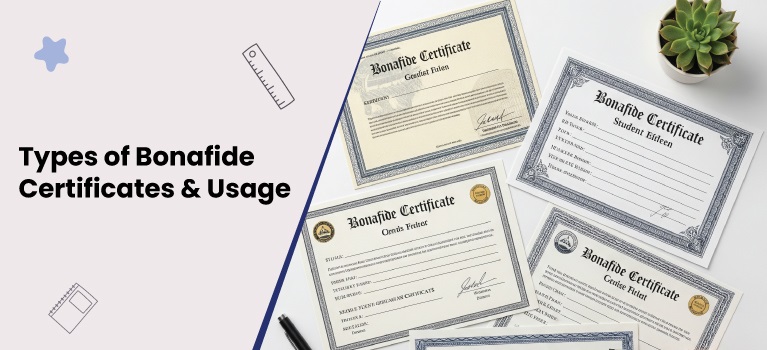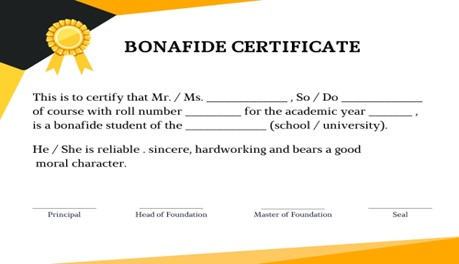The term “Bonafide” is derived from Latin, meaning “in good faith.” In essence, a Bonafide Certificate validates that an individual is genuinely associated with a particular institution or organization. It provides details such as the individual’s name, date of birth, parent’s name, course pursued, or designation in the office. The specifics included in the certificate depend on its type and the purpose for which it is required
Why Bonafide Certificates Are Needed
A Bonafide Certificate serves multiple purposes across different sectors. Its role extends beyond academic verification and is recognized in various official and administrative procedures:
- Student-related: Scholarships, loans, internships, attestation of enrollment status
- Employee-related: Proof of employment for job applications or background verification
- Visa & Immigration: Proof of education/employment status for consulates
- Financial: Supporting documentation for loans or subsidies
- Government schemes: Proof of association for welfare or reservation access
In this article, we’ll explore what a bonafide certificate is, when it’s required, the ideal format, essential components, and sample templates to help you write or request one accurately.
Types of Bonafide Certificates
Bonafide Certificates are categorized based on the individual’s affiliation and the purpose for which they are issued:
Educational Bonafide Certificate
Issued by schools, colleges, or universities, this certificate confirms a student’s enrollment in a specific course or program. It’s commonly required for:
- Applying for scholarships or educational loans.
- Obtaining student visas for studying abroad.
- Availing travel concessions or discounts.
- Participating in academic conferences or events.
Employment Bonafide Certificate
Provided by employers, this certificate verifies an individual’s employment status within the organization. It’s essential for:
- Applying for personal loans or mortgages.
- Processing visa applications for work or travel.
- Verifying employment during background checks.
- Participating in professional development programs.
Residential Bonafide Certificate
Issued by local administrative bodies such as Gram Panchayat, Tehsil, Municipal Corporation, or District Collector’s office, this certificate certifies that an individual is a permanent resident of a specific village, town, city, or state. It’s commonly required for:
- Applying for government jobs under state/local quota.
- Admission under domicile reservation.
- Proof of residence for legal and administrative processes.
- Accessing state-specific schemes, subsidies, or welfare programs.
Process to Obtain Bonafide Certificate
Application
- Submit a written request or complete the institution’s prescribed form.
- Provide valid ID (Aadhaar, student ID, employee ID).
Submission of Documents
- Enclose any supporting proof, such as school fees slip or employment contract.
Processing
- The administration verifies and issues the certificate.
Collection
- Temporary certificates might take a few days; permanent ones may take longer, depending on policy.
Also Read: How to Get a Domicile Certificate in India for Students?
Bonafide Certificate — Sample Template & Format
A robust bonafide certificate typically includes:
- Full name of the person
- Parent/guardian’s name
- Enrollment/Employee ID
- Course or position with duration
- Institution/employer name and logo
- Date of issue
- Seal, signature, and designation of issuing authority
Here is a sample template & format for a Bonafide Certificate Application:
BONAFIDE CERTIFICATE
Date: [DD/MM/YYYY]
This is to certify that [Full Name], son/daughter of [Parent’s Name], is a bonafide student/employee of [Institution/Organization Name]. He/She has been enrolled in [Course/Department Name] and is currently studying in [Year/Level of Study] for the academic year [Year].
The student/employee has been a part of this institution since [Date of Enrollment/Joining].
This certificate is being issued at the request of the student/employee for the purpose of [mention the purpose, e.g., visa application, scholarship application, etc.].
We wish him/her all the best in his/her academic endeavors.
Signature of Authorized Signatory
[Name of Authorized Person]
[Designation]
[Institution/Organization Name]
[Institution’s Seal]
Documents Required for a Bonafide Certificate
The documents required may vary depending on the issuing authority, but generally, the following documents are required:
For Students:
- Student ID card
- Admission receipts or fee payment proof
- A request letter addressed to the head of the institution
For Employees:
- Employee ID
- Payslips (if required)
- A formal request letter to the HR or department head
For Residents:
- Proof of residence (Aadhar card, utility bill, etc.)
- Application form (if required by local authorities)
Bonafide Certificate — How to Apply
From Institutions or Employers:
- Submit a written request or fill out the designated form.
- Provide supporting documents (ID, enrollment/employment letter, fee slips, etc.).
- After review, receive the certificate—either digitally or physically—in a few working days.
From Local Authorities:
- Visit Panchayat, Municipality, or Tehsil office.
- Fill out the application form with personal and residential details.
- Attach address-proof documents (Aadhaar, voter ID, utility bills).
- After verification, obtain the certificate in person or online.
Bonafide Certificate Validity
The validity of a Bonafide Certificate depends on the purpose for which it is issued:
- For educational purposes (e.g., scholarships, visa applications), it is often valid for six months to one year.
- For employment purposes, it is typically valid for as long as the person remains employed.
- For residential purposes, it may be valid until the person changes their residence or locality.
Bonafide Certificate — Common Mistakes to Avoid
- Incomplete or unclear information: Omit course/duration or purpose? It’ll cause delays
- Wrong format: Using generic instead of designated forms can get applications rejected
- Missing documents: Always attach ID, fees receipt, address proof, etc.
- Improper submission channel: Know whether it’s offline or online
- Skipping follow-up: Short processing timelines often cause delays if unchecked
- Duplicate requests: Sending multiple copies wastes administrative effort
- Vague purpose: If it’s for a passport or loan, indicate it clearly to avoid generic responses
- Mismatched details: Inconsistent names or addresses on documents delay processing
Also Read: Scholarships.gov.in
Bonafide Certificate — FAQs
What is a Bonafide Certificate?
A Bonafide Certificate is an official document that confirms a person’s affiliation with an institution, organization, or local body. It is used for purposes like scholarship, visa, job applications, and government schemes.
Who can request a Bonafide Certificate?
Students, employees, or residents affiliated with an institution, employer, or local authority can request it. Students apply to their school/college, employees to HR, and residents to local bodies.
Why is a Bonafide Certificate required?
It is needed for applying to scholarships, loans, admissions, employment, government benefits, and proving residence or enrollment status.
What is the validity of a Bonafide Certificate?
Typically valid for 6 to 12 months, depending on the issuing institution and purpose of use.
How do I apply for a Bonafide Certificate?
Submit a formal request letter with supporting documents (ID, proof of affiliation) to the concerned office. Processing usually takes a few days.
Can a Bonafide Certificate be used for multiple purposes?
Yes, it can be reused for different academic or official purposes if it remains within its validity and suits the requirement.
Can I get a Bonafide Certificate if I am not enrolled in the institution?
No. Only currently affiliated individuals can receive a Bonafide Certificate. Former members are not eligible.
Is there a fee for obtaining a Bonafide Certificate?
Usually it's free, but some institutions or government offices may charge a nominal processing fee.
How long does it take to receive a Bonafide Certificate?
It typically takes 3 to 10 business days. Some institutions offer urgent processing.
Can I request a Bonafide Certificate online?
Yes, many institutions offer online request facilities through student or employee portals. Check your institution’s website.
What should be included in a Bonafide Certificate application?
Include a request letter, your ID, course/department details, reason for request, and supporting documents like fee receipts or proof of residence.
How can I ensure my Bonafide Certificate is accepted by authorities?
Ensure it includes correct personal details, purpose, official signature, seal, and date of issue.
What if my Bonafide Certificate is delayed or not issued?
Follow up with the concerned authority. If unresolved, escalate to higher officials within the organization.
Can the Bonafide Certificate be notarized?
Yes, for legal or international use, you may need to get it notarized by a public notary.






